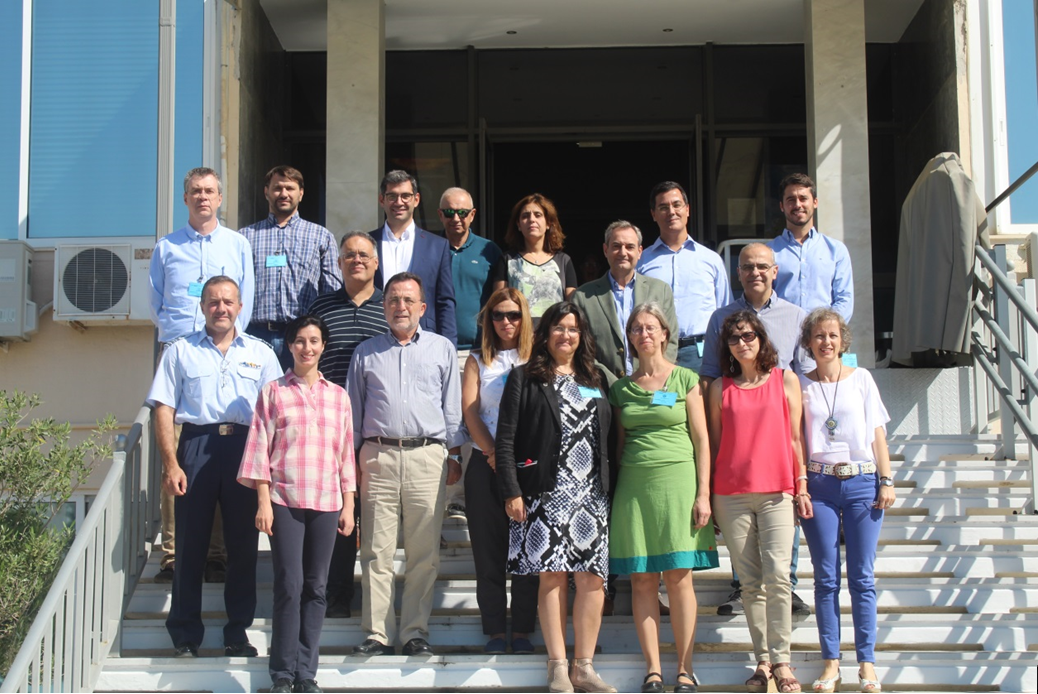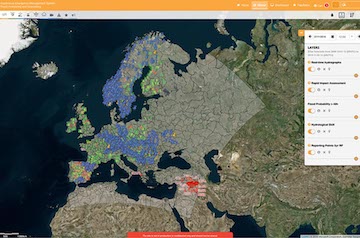
On October 14-15, the EFAS Dissemination Centre and the Hydrology Data Collection Centre provided training to the two EFAS partners in Greece; the Hellenic National Meteorological Service (HNMS) and the General Secretariat for Civil Protection of Greece (GSCP).
The mission aimed to provide:
• Introduction to the EFAS service and existing products, including a presentation on new and upcoming products.
• Training on how to use the EFAS-IS and extract hydro-meteorological information for forecasted extreme events
• Demonstration on how to provide feedback for received notifications
• Reference on existing hydrological data around the country and how these can be shared.
The 2-day training took place in Athens, Greece at the headquarters of the HNMS, and was held by Michaela Mikulickova and Ilias Pechlivanidis from the EFAS Dissemination Centre, Mercedes García Padilla, Rafael J. García Sánchez and David Blanco de Córdova Muñoz from the Hydrological Data Collection Centre. About 20 participants from the two EFAS partners in Greece attended the training, and those were forecasters and researchers in the meteorological service, staff from the observational data collection group, and officers from the national and regional civil protection agency. Some of the participants had experience in using the EFAS-IS, others had participated in the EFAS Annual Meeting, however for most participants the training was the first introduction to the service and its products.
On the first day, the EFAS team received a warm welcome from the Commander of HNMS (the host institute), following by presentations on the mission of HNMS and GSCP, and the added-value of their operational services. The EFAS Dissemination Centre gave an introduction to EFAS (consisting of the EFAS general information, information about LISFLOOD model, probabilistic forecasting, meteorological inputs, EFAS thresholds, EFAS notifications, and flash floods) followed by a discussion on the performance of the different EFAS products. Then, the EFAS Hydrological Data Collection Centre presented their operations and workflows talking about data transfer, data harmonization, data quality control and validation, collaborations in EFAS products such as reports and bulletins, incident management and partner communications.
On the second day, the EFAS Dissemination Centre presented the new EFAS products (rapid impact assessment and rapid flood mapping, seasonal outlooks and 6-hourly calibration), and guided the partners on how to give feedback to the flood notifications sent. The participants had a very interesting discussion on the EFAS products and their reliability over Greece, whilst the hands-on session on the EFAS-IS gave everyone the opportunity to explore the EFAS Interface and options available (i.e. hydro-meteorological variables, meteorological animations, satellite images etc.). In this session, the participants used their own computers and accessed the EFAS-IS in a test environment. Finally, the training was completed with a presentation and discussion on a Greek case study. The selected event was thoroughly investigated and, based on the available EFAS products, the drivers that triggered the flooding were identified and discussed. In this session, Artemis Papapetrou (HNMS) presented a summary and evaluation of issued EFAS notifications for Greece during 2016-2019, including cases when EFAS predictions had been adequate and also cases with missed events.
A very positive feedback was given to the EFAS team, since the participants were satisfied with the mission. The EFAS partners in Greece expressed their gratitude for the training, and highlighted their high interest of the service.

